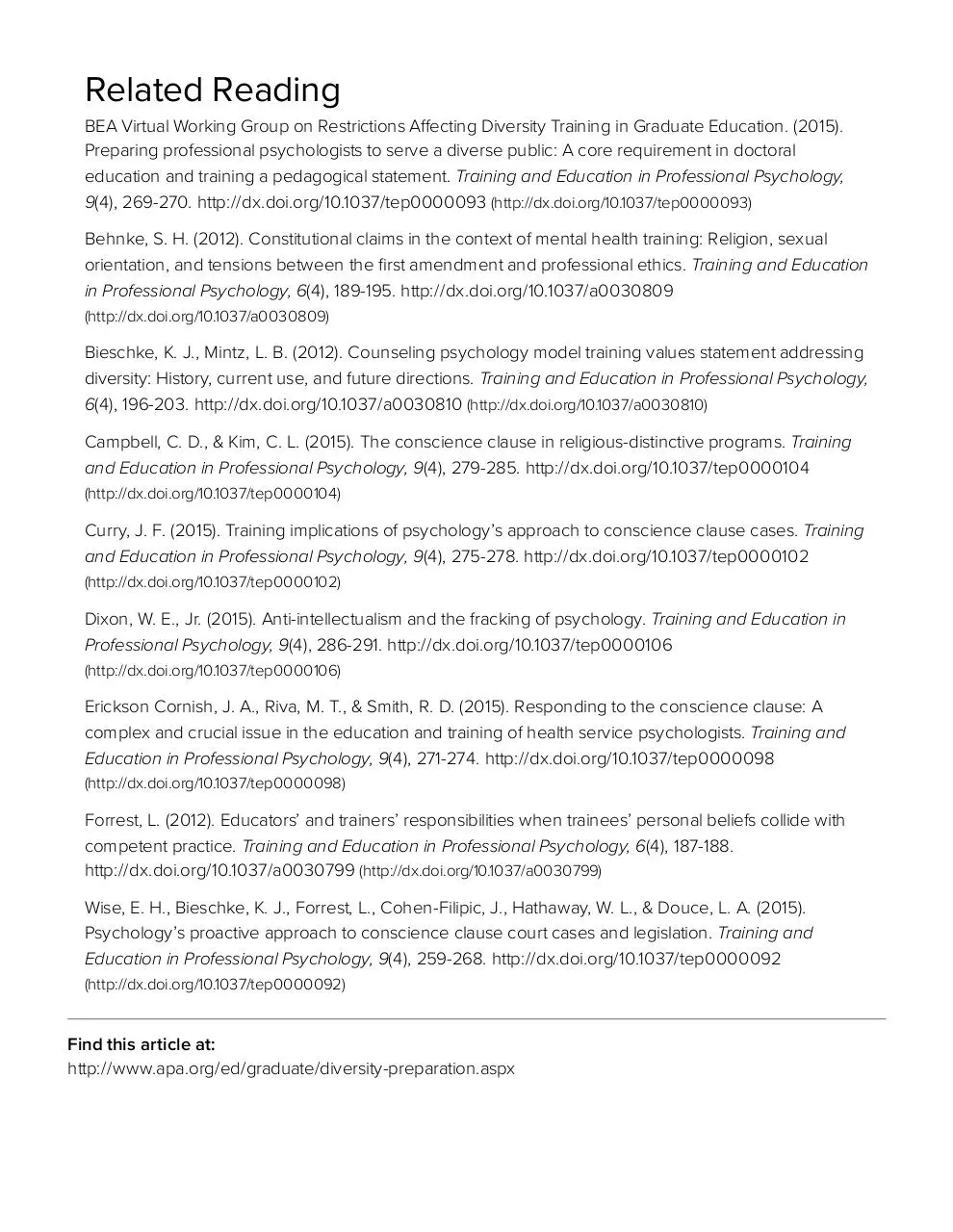APsyA Serving a Diverse Public (PDF)
File information
This PDF 1.4 document has been generated by Mozilla/5.0 (Windows NT 5.1) AppleWebKit/537.36 (KHTML, like Gecko) Chrome/49.0.2623.112 Safari/537.36 / Skia/PDF, and has been sent on pdf-archive.com on 21/11/2017 at 03:02, from IP address 172.58.x.x.
The current document download page has been viewed 224 times.
File size: 104.08 KB (3 pages).
Privacy: public file



File preview
Serving a Diverse Public
For psychologists to competently serve all members of the public now and in the future, professional
psychology training programs strive to ensure that psychology trainees demonstrate acceptable levels
of knowledge, skills and awareness to work effectively with diverse individuals. Clients/patients are
complex individuals who belong to diverse cultures and groups. Trainees also bring a complex set of
personal characteristics and diverse cultural or group memberships to the education and training
process.
An important component of psychology training to explore is when and how trainees’ world views,
beliefs or religious values interact with and even impede the provision of competent professional
services to members of the public. It is essential that potential conflicts be acknowledged and
addressed during training so that psychologists are prepared to beneficially and non-injuriously interact
with all clients/patients.
Preparing Professional Psychologists
Preparing Professional Psychologists to
Serve a Diverse Public
This document was prepared as an educational summary by the Working Group on Restrictions Affecting Diversity
Training in Graduate Education and approved by the Board of Educational Affairs in March 2013. It was not reviewed
by APA's Council of Representatives and thus is not APA policy.
This statement is intended to help training programs address conflicts between trainees’
worldviews, beliefs or religious values and professional psychology’s commitment to offering
culturally responsive psychological services to all members of the public, especially to those
from traditionally marginalized groups.
Commitment to a Supportive Training Environment
Training environments foster the ability of trainees to provide competent care to the general
public, and trainees’ competencies in professional practice are evaluated regularly. Some
trainees possess worldviews, values or religious beliefs that conflict with serving specific
subgroups within the public. For example, they may experience strong negative reactions
toward clients/patients who are of a particular sexual orientation, religious tradition, age or
disability status. Trainers take a developmental approach to trainee skill and competency
acquisition and support individual trainees in the process of developing competencies to work
with diverse populations. Trainers respect the right of trainees to maintain their personal belief
systems while acquiring such professional competencies. Trainers also model the process of
personal introspection; the exploration of personal beliefs, attitudes and values; and the
development of cognitive flexibility required to serve a wide diversity of clients/patients.
Training to work with diverse clients/patients is integral to the curriculum, and consists of both
didactic coursework and practical training.
Training programs, trainers and trainees cannot be selective about the core competencies
needed for the practice of psychology because these competencies are determined by the
profession for the benefit of the public. Further, training programs are accountable for
ensuring that trainees exhibit the ability to work effectively with clients/patients whose group
membership, demographic characteristics or worldviews create conflict with their own.
Trainers respectfully work with trainees to beneficially navigate value- or belief- related
tensions. At times, training programs may wish to consider client/patient re-assignment so
trainees have time to work to develop their competence to work with client/patients who
challenge trainees’ sincerely held beliefs. Trainers utilize professional judgment in determining
when client/patient re-assignment may be indicated in this situation as in all other possible
situations in which client/patient re-assignment may be considered. The overriding
consideration in such cases must always be the welfare of the client/patient. In such cases,
trainers focus on the trainees’ development, recognizing that tensions arising from sincerely
held beliefs or values require pedagogical support and time to understand and integrate with
standards for professional conduct. Thus trainees entering professional psychology training
programs should have no reasonable expectation of being exempted from having any
particular category of potential clients/patients assigned to them for the duration of training.
Commitment to Transparency in Educational Expectations, Policies and
Procedures
Psychology training programs inform prospective trainees and the public of expected
competencies to be attained during training. Publicly available program descriptions and
admission materials should include the program’s goals and objectives, content about training
standards and the commitment to serving a diverse public. These expectations are reiterated
throughout the course of training and in documents such as practicum contracts. Training
programs are responsible for notifying prospective trainees, current students and the public
that the failure to demonstrate appropriate levels of competence as set forth and assessed by
the program could lead to dismissal from the doctoral training program.
Commitment to Establishing and Maintaining Standards for Professional
Competence to Protect the Public
As the largest professional and scientific organization of psychologists in the United States, the
American Psychological Association has sought to create, communicate and apply
psychological knowledge for the public’s benefit for more than a century. It does this, in part,
by establishing a professional code of ethics and standards for professional education and
training for practice. These APA documents mandate that education and training programs
take reasonable steps to ensure that doctoral-level graduates are prepared to serve a diverse
public.
This statement was prepared as an educative summary of relevant pedagogical principles applicable to doctoral
training of psychologists and is consistent with both the APA Ethics Code (2010) and the Guidelines and Principles for
the Accreditation of Professional Psychology Programs of the APA's Commission on Accreditation (APA, 2012). APA’s
Ethics Committee and the Commission on Accreditation are responsible for interpreting and adjudicating these
standards. This statement supports and is not intended to supersede either of these documents.
Competence for Psychological Practice
Related Reading
BEA Virtual Working Group on Restrictions Affecting Diversity Training in Graduate Education. (2015).
Preparing professional psychologists to serve a diverse public: A core requirement in doctoral
education and training a pedagogical statement. Training and Education in Professional Psychology,
9(4), 269-270. http://dx.doi.org/10.1037/tep0000093 (http://dx.doi.org/10.1037/tep0000093)
Behnke, S. H. (2012). Constitutional claims in the context of mental health training: Religion, sexual
orientation, and tensions between the first amendment and professional ethics. Training and Education
in Professional Psychology, 6(4), 189-195. http://dx.doi.org/10.1037/a0030809
(http://dx.doi.org/10.1037/a0030809)
Bieschke, K. J., Mintz, L. B. (2012). Counseling psychology model training values statement addressing
diversity: History, current use, and future directions. Training and Education in Professional Psychology,
6(4), 196-203. http://dx.doi.org/10.1037/a0030810 (http://dx.doi.org/10.1037/a0030810)
Campbell, C. D., & Kim, C. L. (2015). The conscience clause in religious-distinctive programs. Training
and Education in Professional Psychology, 9(4), 279-285. http://dx.doi.org/10.1037/tep0000104
(http://dx.doi.org/10.1037/tep0000104)
Curry, J. F. (2015). Training implications of psychology’s approach to conscience clause cases. Training
and Education in Professional Psychology, 9(4), 275-278. http://dx.doi.org/10.1037/tep0000102
(http://dx.doi.org/10.1037/tep0000102)
Dixon, W. E., Jr. (2015). Anti-intellectualism and the fracking of psychology. Training and Education in
Professional Psychology, 9(4), 286-291. http://dx.doi.org/10.1037/tep0000106
(http://dx.doi.org/10.1037/tep0000106)
Erickson Cornish, J. A., Riva, M. T., & Smith, R. D. (2015). Responding to the conscience clause: A
complex and crucial issue in the education and training of health service psychologists. Training and
Education in Professional Psychology, 9(4), 271-274. http://dx.doi.org/10.1037/tep0000098
(http://dx.doi.org/10.1037/tep0000098)
Forrest, L. (2012). Educators’ and trainers’ responsibilities when trainees’ personal beliefs collide with
competent practice. Training and Education in Professional Psychology, 6(4), 187-188.
http://dx.doi.org/10.1037/a0030799 (http://dx.doi.org/10.1037/a0030799)
Wise, E. H., Bieschke, K. J., Forrest, L., Cohen-Filipic, J., Hathaway, W. L., & Douce, L. A. (2015).
Psychology’s proactive approach to conscience clause court cases and legislation. Training and
Education in Professional Psychology, 9(4), 259-268. http://dx.doi.org/10.1037/tep0000092
(http://dx.doi.org/10.1037/tep0000092)
Find this article at:
http://www.apa.org/ed/graduate/diversity-preparation.aspx
Download APsyA Serving a Diverse Public
APsyA Serving a Diverse Public.pdf (PDF, 104.08 KB)
Download PDF
Share this file on social networks
Link to this page
Permanent link
Use the permanent link to the download page to share your document on Facebook, Twitter, LinkedIn, or directly with a contact by e-Mail, Messenger, Whatsapp, Line..
Short link
Use the short link to share your document on Twitter or by text message (SMS)
HTML Code
Copy the following HTML code to share your document on a Website or Blog
QR Code to this page

This file has been shared publicly by a user of PDF Archive.
Document ID: 0000699493.